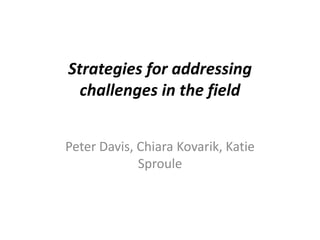
Training Session 2 – Davis – Challenges in the Field
- 1. Strategies for addressing challenges in the field Peter Davis, Chiara Kovarik, Katie Sproule
- 2. Potential challenges in the field • sensitive topics • research that could lead to harm to research participants or others • complex or abstract topics • other practical challenges • some approaches, strategies, principles
- 3. Sensitive topics and potential harm • Deeply personal or private subjects or experiences; • Potential harm or danger to researcher or respondents, or others; • Subjects that may cause emotional responses - e.g. trauma, anger, grief, shame, regret, embarrassment; • Uncovering situations that may create create conflict, involving vested interests, dominance, coercion - e.g. domestic violence, patron-client relationships, powerful gatekeepers; • Research that may uncover illegal activities - e.g. violent crime, dowry; • Social stigma or taboo subjects - e.g divorce, forms of illness or disability, stigmatized occupations, deviance, social control; death, sex, infidelity; • Things that are sacred, or that can be profaned, disrespected or cause offence; • Information that could affect funding of projects, career prospects, reveal corruption, incompetence, failure; • Biased information - on success of projects, undermining rivals, avoiding difficulties.
- 4. Complex or abstract topics • Contexts that are difficult to understand • Complex causes – some research questions are impossible to answer definitively • Some topics involve understanding a different world view from your own • Language gaps create challenges
- 5. Empowerment: a complex topic For example: Lukes’ Dimensions of power: From ‘Power: A Radical View 1) Decision making 2) Agenda setting 3) Preference formation
- 6. Other challenges • Managing participant expectations and assumptions • Working with reluctant participants • Practical difficulties in arranging interviews • Compensation for participants • Researcher safety - in travel and accessing research sites
- 7. Discussion exercise With a partner discuss for 4 minutes any challenging fieldwork situations you have faced. Discuss what you did, or could have done, to help overcome the problem. One of you may summarize the issues raised briefly in the plenary discussion time.
- 8. Some general principles • Rapport and trust can build within a longer interview; • Setting is important; • Explain research aims clearly; • Prepare interviewees in advance; • Start with straightforward, factual questions; • Interview questions should be as simple and concrete as the topic allows; • Set the tone, encourage recall of detail, concrete examples; • Be aware of the power dynamics in research relationships: status difference, knowledge, official persona, actual or perceived influence of researchers, gender, foreign or local status.
- 9. Interview formality • Unstructured interviews are more challenging with interpreters • Elite interviewees (govt. officials) may prefer more structured interviews • Local expectations – people may expect a formal interview due to previous experience or norms around treatment of outsiders
- 10. Interview setting • In people’s homes? • Are there others present? • Interviews in the workplace – pros and cons • Be aware of dangerous places • Gender issues –women interviewing men and vice-versa • Timing is important – for atmosphere, formality, availability, daily, seasonal demands
- 11. Asking questions and recording • Don’t interrogate or fire questions • Allow people time to shape their responses • Relax. Ask people if they are comfortable, have eaten etc. • Don’t ask sensitive questions at the start of an interview • Open the interview with uncomplicated factual questions • Try to ask open-ended questions to prevent short answers but also help people to remember and to develop their ideas • Be prepared for emotional responses and decide what to do when they happen • Give the respondent the opportunity to ask you questions • Recording is useful – For analysing vocabulary, forms of expression, crosschecking etc. – Is also useful for adding your own ‘dictated’ notes after the interview – personal observations, how the interview went, non-verbal communication, setting etc. – But can inhibit responses • Allow for discussion after the recorder is switched off
- 12. Interview types and styles • Chronological interviews can allow difficult subjects to arise more naturally; • Focus groups - can allow difficult subjects to be discussed within the security of a group; but not without risks if the discussion of a sensitive topic becomes specific or personal; • Be prepared for interviews that won’t work well – practice interviews, formal situations, checklists; • Using thought experiments and counterfactuals - sometimes being an outsider can be useful – if you create a learner - explainer relationship; What would happen if … ? Why did he do that …? • Vignettes; • Checking how questions are understood – recapping, cognitive testing, cross-checking; • Use diagrams, props, ranking exercises - take photos of diagrams, audio-record ranking discussions;
- 13. After the interview • Off the record - sometimes the most valuable insights are given off the record, after an interview or by other people - it is useful to have a fieldwork diary or make notes on the interview. • Multiple visits can allow checking and follow up on findings; • Discuss interviews with other researchers - learn and adjust; – Within researcher focus groups and debriefs and be useful when working in a team; • Minimize risk of physical or psychological harm to researchers and analysts; – Allow time and money to debrief, discuss safety, contingency arrangements, emergencies. • Protect information – Be aware of where the 'data' will/ could go. If a funding organization needs data, allow time to anonymise data in the budget. Can participants be identified? Will trust be betrayed? Can respondents clearly understand what they are consenting to? How does consent relate to power dynamics?
